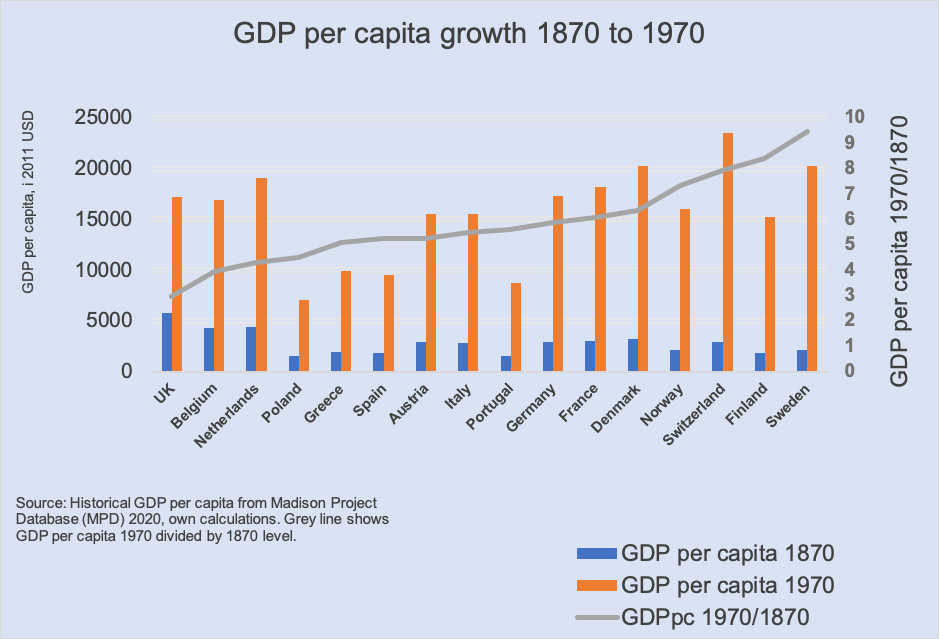
Over a hundred years ago, Max Weber observed that countries in northern Europe tended to have a higher standard of living and generally more well-functioning societies than countries in other parts of Europe. He believed that the reason for the formers’ success lay in their Protestant work ethic.1 The Swedish economist Assar Lindbeck added a geographical element to this theory, arguing that it historically was difficult to survive as a farmer in the Nordic countries. The unforgiving climate simply made it necessary for farmers to work unusually hard to survive. This situation created cultural norms focused heavily on individual responsibility and hard work.2
What makes the Nordic countries unique is that they historically combined a cold climate with widespread private ownership, which together produced strong individual incentives to work hard. It is evident that norms of hard work and social trust evolved in the Nordics before industrialization. However, in the last decades of the 20th century, the Nordic countries’ witnessed a degradation of norms, linked to an increasingly generous welfare state as well as a shift towards student influence and student-led teaching methods in the education system.
Working Norms, Trust and Cohesion Evolved as Survival Mechanism
A good example of how the environment and social conditions affect cultural norms can be found in a poem by the Finnish-Swedish author Johan Ludvig Runeberg, written after a visit to the Finnish city of Saarijärvi in the 1820s. Through the farmer Paavo, who supported his family by cultivating the land in the inhospitable climate, Runeberg portrayed the hard struggle for survival. Floods in the spring and hailstorms in the summer destroyed many of the crops. The cold weather in the autumn destroyed the rest. Paavo and his wife were forced to mix bark from trees in their bread to survive, a practice common among farmers in this part of the world at this point in time. Next year, Paavo worked even harder to dig ditches to improve his land. Again, he was rewarded with a meager harvest due to bad weather. The family mixed even more bark in their bread to survive in the second year, and Paavo worked even harder. Finally, the third year's harvest did not get ruined by bad weather, and Paavo's wife happily declared that they could now afford to stop mixing bark in their bread. But Paavo insisted that they continue to do so, as they should share their food with their neighbors, whose harvest had once again been ruined by the harsh weather.3
The story of Paavo illustrates that farmers in the Nordic countries not only needed a stoic determination to work hard, but also social trust and cohesion. Without hard work and cooperation, Paavo's family and neighbors would have a hard time surviving. The poem also illustrates that landowning peasants, unlike landless peasants in many other parts of the world, had much to gain from raising the productivity of their farms. They showed solidarity with their neighbors and lived in a culture where hard work was necessary for survival. In this context, norms of cooperation, punctuality, honesty, and hard work were formed.
Norms Paved the Way for Unique Economic Growth
In other countries, Nordic people have for generations been seen as diligent and honest.4 There are also clear signs that Nordic societies, thanks to this unique culture, were well organized even before the industrial revolution. A book written by the Danish-French geographer and journalist Conrad Malte-Brun in 1834 discusses the excellent roads that had been built in Sweden, and how civil rights were protected both in Sweden and in Finland.5 An English history book about the Nordic countries, published in 1838, contains a similar description of the Norwegians: “The Norwegians may be considered an industrious people; but from the poverty and limited resources of the country, their genius is compelled to operate within a narrow sphere, and can rarely avail itself of extensive improvements.”6 The common theme of these observations was that people in the Nordic countries were honest and hard-working, traits that were considered to have been formed so that people could survive in the unforgiving cold climate.
Around 1870, market reforms were carried out in Sweden. (Denmark industrialized earlier, Norway and Finland a bit later.) As we can see in the figure below, during the 100 years that followed, Sweden’s growth shot through the roof. In fact, Sweden’s growth was the highest in Europe. Finland came in second place, Norway came in fourth place, and Denmark came in fifth place.

Prosperity and Equality Evolved Before the Large Welfare State
Many believe that Nordic societies’ high levels of income equality were created through high-tax and redistributive policies. But during the 100 years of phenomenal economic growth between around 1870 and 1970, these societies were in fact free-market oriented and had low taxes. Indeed, Swedish researchers Jesper Roine and Daniel Waldenström have shown that Sweden had an unusually equal income distribution as early as 1920. Until around 1980, equality continued to increase. In fact, most of the improvements occurred before the shift from low to high taxes.7 In another article, researchers Anthony Atkinson and Jakob Søgaard confirm that the high levels of equality in Sweden were mostly generated before the transition to a high-tax society.8
This does not mean that the welfare state was irrelevant for increasing equality in Scandinavia. The development of the early welfare state – and of trade unions – coincided with increasing levels of equality. Early redistributive policies and associated reforms therefore probably played a role in decreasing income inequality, although the overall tax burden was not very high.
However, another explanation for the country’s strong, and egalitarian, economic development is its school system. Indeed, the early school system, which emerged from the second half of the 19th century, emphasized the importance of academic knowledge as well as norms of hard work and individual responsibility.9 In this way, it likely contributed to the norms that underpinned the strong economic performance from the late 19th century onwards.
Growing Nordic Welfare Systems Are Linked to Declining Norms
Yet it is also evident that the growth of the generous welfare state has coincided with a worsening of societal norms in Sweden. In the early 1980s, 79 percent of Swedes believed that it was never acceptable to claim government benefits to which one is not entitled. By around the new millennium, the figure had plummeted to 55 percent. It has since recovered somewhat to 63 percent following retrenchments of the welfare system, and public campaigns to change popular attitudes toward the overutilization of public funds. Similarly, in the beginning of the 1980s, fully 76 percent of Swedes believed that it would be wrong to put less importance on work in the future. By around 2000, this figure had fallen to 15 percent. Since then, tax cuts and reduced generosity of the welfare state, have likely contributed to increasing this figure to 40 percent. Importantly, reforms of the Swedish welfare state have been focused on changing popular norms toward work and individual responsibility in a positive direction.
Student-led Education is Also a Culprit
There is also a clear link between the development of norms and the education system. In the mid-1990s, an international survey of adult skills showed that Sweden came in first place among the countries included in the survey. In addition, the variance in results was relatively low; knowledge was relatively evenly distributed in the population.10 This was likely the product of the teacher-led educational model that had existed in Sweden up until the 1990s. Historically, as noted, this model was also much more focused on improving students’ non-cognitive skills, such as grit and self-discipline.
But as Sweden gradually shifted toward a student-led educational model, performance fell considerably. The emphasis on non-cognitive skills was replaced by a focus on the inculcation of politically liberal and democratic attitudes among students.11 While these attitudes may well be important, the complete lack of emphasis on non-cognitive skills in today’s education system is conspicuous.
As we show in our forthcoming book, the decline in norms was particularly significant among young adults. For example, in the early 1980s, only 36 percent of Swedish young adults believed that it ever could be right to claim government benefits to which one is not entitled. Today, the level is as high as 67 percent. In the early 1980s, 65 percent of young people also thought that it would be bad to put less importance on work in the future. Today, the figure is 37 percent.
Interestingly, immigration does not seem to play a key role in this change, as foreign-born and Swedish-born individuals have very similar attitudes in these respects. Instead, it appears as if norms in general have shifted, as a response to the general growth of the welfare state as well as the changes in the education system. Importantly, it also appears as if norms among the young have not recovered from the low point around 2000 to the same extent as norms among older people.
The Future
In today’s world, cold weather is not as supportive of a strong work ethic in the population as it was in pre-industrial times. A key challenge for Nordic countries in the coming decades will therefore be to pursue policy reforms to strengthen their populations’ norms toward hard work and individual responsibility. In this regard, it is certainly important to consider changes to the welfare state to improve incentives for people to work. But it is not sufficient. As discussed above, we also believe changes to the education system are partly responsible for undermining the cultural norms that existed in Scandinavia until the late 20th century. Reforms to the education model in a more teacher-led direction, and with a stronger emphasis on students’ non-cognitive skills, would therefore also support improvements in norms among young people. If successful, economic and education reforms could, via the improvements in cultural norms, help to stimulate both higher growth and economic equality in the future.
Endnotes:
1. Nelson, R.H. (2010). “Max Weber Revisited,” in Ilkka Pyysiäinen, (Ed.) “Religion, Economy, and Cooperation”, Walter de Gruyter GmbH & Co., Berlin/New York.
2. Lindbeck, A. (1995). ” Hazardous Welfare-State Dynamics,” American Economic Review 85, No. 2: 9–15; Lindbeck, A. (2003). “An Essay on Welfare State Dynamics,” CESifo Working Paper Series no. 976.
3. The poem “Saarijarven Paavo” is found in Huldén, L. (ed.) (1998). ”Johan Ludvig Runeberg Dikter”, Atlantis, Stockholm.
4. Stockdale, J.J. (1807). “The History of Gustavus Adolphus, King of Sweden, Surnamed the Great, 3rd ed., vol. 1” Hausard, London.
5. The Treasury of Knowledge and Library of Reference (1834). 5th ed., s.v. “Sweden.”
6. Crichton, A. & H. Wheaton (1838). “Scandinavia, Ancient and Modern, Being a History of Denmark, Sweden and Norway, vol. 2”, Oliver & Boyd, Edinburgh.
7. Roine, J. & D. Waldenström (2008). “The Evolution of Top Incomes in an Egalitarian Society; Sweden, 1903–2004” Journal of Public Economics 92, nos. 1–2:366-387.
8. Atkinson, A.B., & J. E. Søgaard (2013). “The Long-Run History of Income Inequality in Denmark: Top Incomes from 1870 to 2010”, EPRU Working Paper Series, Department of Economics, University of Copenhagen.
9. Heller-Sahlgren, G & N. Sanandaji (2019). ”Glädjeparadoxen: Historien om skolans uppgång, fall och möjliga upprättelse”.
10. ITPS (2001). “Under- och överutbildning på 2000-talets arbetsmarknad – en förstudie av matchningen mellan utbildning och kvalifikationskrav.” A2001:006, Östersund.
11. Heller-Sahlgren, G & N. Sanandaji (2019). ”Glädjeparadoxen: Historien om skolans uppgång, fall och möjliga upprättelse”.
Dr. Nima Sanandaji is director ECEPR (European Centre for Entrepreneurship and Policy Reform)
Dr. Gabriel Heller-Sahlgren, Research Fellow at the Research of Industrial Economics.
Authors of the forthcoming book Normboken (in Swedish)
Photo: Nordic Aquafarms via Flickr under CC 2.0 License













Milton Friedman
A Scandinavian economist once said to Milton Friedman: In Scandinavia, we have no poverty.
Milton Friedman replied: That’s interesting, because in America, among Scandinavians, we have no poverty, either.